LIXIL makes pioneering water and housing products that solve everyday, real-life challenges, making better homes a reality for everyone, everywhere.
- Global Site
-
- English
- Japanese
- Brand Sites
Global
- Global Site
-
- English
- Japanese
- Brand Sites
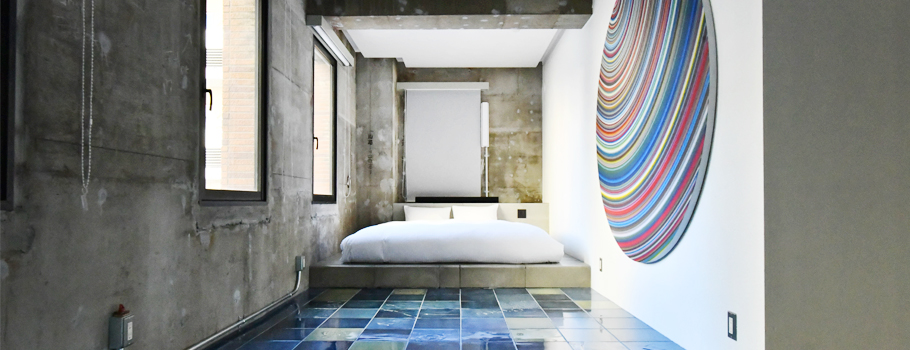
Updated: August 19, 2021.
In an age when products can be bought with a mere few taps on a device and delivered to your doorstep shortly after, physical retail businesses are looking to new experiences to stand out. These can vary in shape, size and form, from setting up playgrounds and dog runs within shops to creating unique photogenic desserts to draw in active social media users. Such experiences alone serve as incentives for consumers, helping to generate long-term loyalty and business.
LIXIL Ceramics Lab x BnA Wall's "Art you can stay in"
The hotel industry has long valued customer experiences, but more recently, many have positioned themselves as the purpose of visit by highlighting extraordinary experiences as a key differentiator. These hotels may have large facilities for groups to hold meetings, conventions and exhibitions, or could be boutique destination hotels that offer tailored, niche experiences.
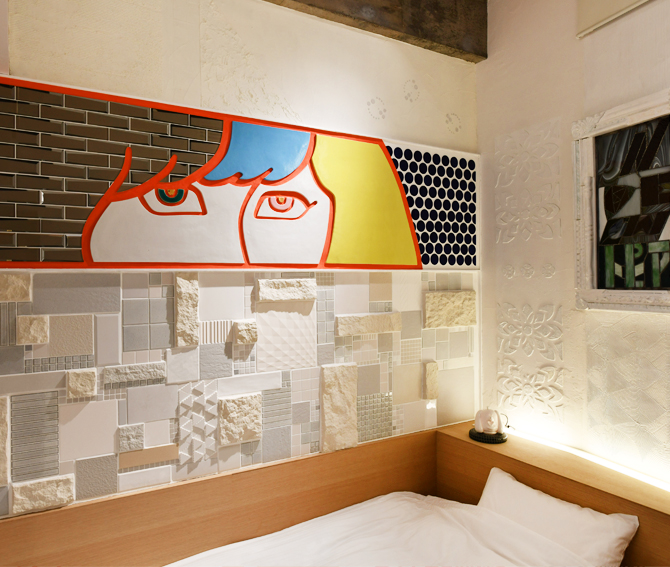
Among such, the BnA (Bed and Art) hotel distinguishes itself from any other, offering experiential lodging with the theme, “art you can stay in.” One could even say that each guest room is a piece of art - every one of their rooms is individually designed and furnished by up-and-coming artists.
Since its opening, the hotel has drawn attention from art lovers both domestic and global, offering an extraordinary experience of staying inside a work of art. It is the first to introduce a system that returns a portion of the tariff to the artist, making each guest a patron.
Following its initial properties in Koenji, Akihabara, and Kyoto, BnA opened BnA WALL in Nihonbashi in April 2021. Among Mitsui Fudosan and other companies, LIXIL was also a part of this experimental project that contributed to its making.
Drawing on its heritage of craftsmanship, LIXIL’ s Ceramics Lab (also previously known as “Monozukuri Kobo”)¹ has expanded the possibilities of ceramics. Located in Tokoname, one of Japan’ s oldest pottery towns with a history of over 1,000 years, the LIXIL Ceramics Lab restores and passes on traditional techniques, while it also promotes ceramic innovation through its collaboration with creators.
LIXIL’ s collaboration with BnA started in 2018, when it was tasked to embody the BnA philosophy and the artists’ perceptions in shaping the customer experience. The approach was poles apart from the mass production model that LIXIL was accustomed to, requiring creative and flexible implementation of ceramic and water business technologies. The iterative process of trial and error resulted in new findings and delivered an exquisite aesthetic.
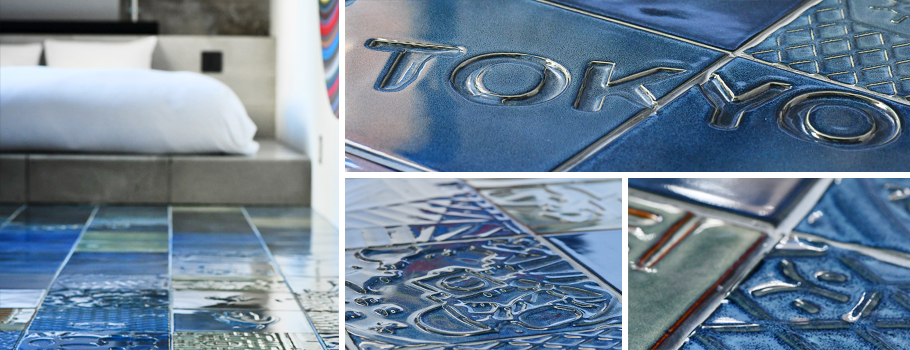
A BnA room with “Namako galze” tiles
As part of creating the room with the concept to “capture the ground of Tokyo,” the artist requested "Namako glaze," which has historically been used for brazier and tableware that has a natural tendency to develop cracks for a quaint look and feel.
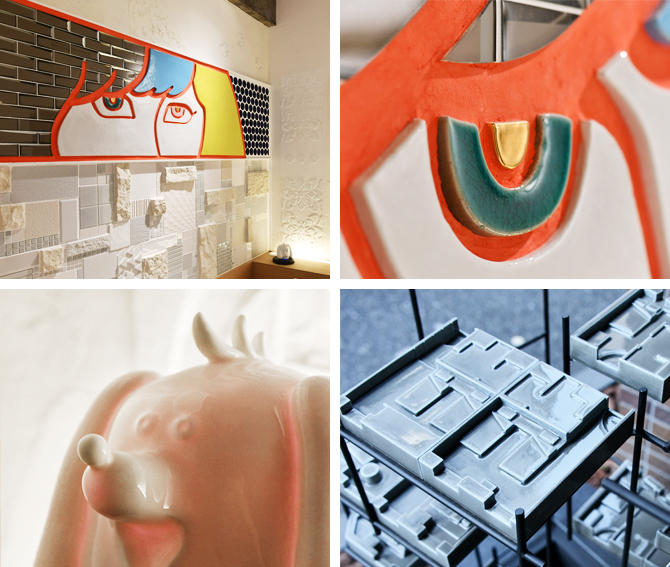
First, ground samples were converted into data using a 3D scanner to reproduce the individual patterns and shaped by machining. The company also developed a proprietary blend of the glaze that would secure the strength and durability required for floor tiles, while allowing the artist to unleash their full creativity. The presence of 100 imaginative and decorative tiles play an essential role in the ambience of the room.
In the guest room with wall tiles, each and every one of the white tiles have a unique pattern or texture. Among these, the face of a woman is composed of meticulously measured tiles, only possible because of LIXIL’ s advanced modeling technique, which calculates the shrinkage rate of clay when baked in a kiln. LIXIL’ s expertise also helped realize the curves of the ceramic lighting and to create a three-dimensional hotel map (floor guide).
One of the rooms has installed LIFECORE, an innovative prefabricated unit that allows placement and construction of a home’ s water infrastructure in one place, which was first introduced at HOUSE VISION 2 in 2016. BnA Wall’ s structure was originally developed for offices and changing it into a hotel required additional draining capacity.
LIFECORE’ s installation at BnA Hotel will serve as a case study for LIXIL to cater to a growing market that involves the repurposing of buildings.
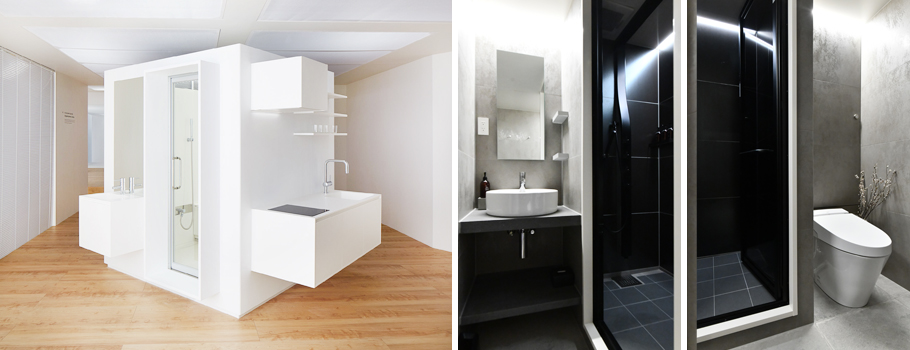
LIFECORE, an innovative system unit that allows placement and construction of a home’ s water infrastructure in one place
Meeting diversified needs
Yasushi Asano, Leader of Business Planning Department and New Business at LIXIL Water Technology Japan said “As Japan’s population continues to shrink, so will the demand for new housing. At the same time, stimulating the demand for renovation and remodeling can expand the market. Users are keen on making the best out of what they own, and there is a growing need to deliver to their preferences. We are certain that we can deliver value that would exceed the time the house was built and help home-owners live the life they dream of.”
Japanese consumers’ lifestyles, life stages, family structure, income and other factors are diversifying their housing needs, and this project served as a case study in embracing smaller, more flexible and high-mix production to respond to consumer niches. BnA and LIXIL share a vision to enhance the value of spaces through experiences.
Even if the mass production framework can’ t respond to personalized requests, Design, R&D and Sales can overcome challenges together to make ‘better homes’ a reality says Yasuhiro Shirai, General Manager, Design and New Technology Division, LIXIL Water Technology Japan. “Collaboration with architects and designers are essential for the LIXIL Ceramics Lab to function. We respond to creators’ novel ideas and challenging requests through experimentation, that is founded on our expertise in ceramics we’ ve celebrated for over 100 years. Consumers are now spending more time and new needs are emerging. We generate new value by responding to consumers by drawing on our technology and design capabilities. I believe that - with the learning we accumulate with projects like this, and our passion to deliver unrivaled experiences, is what makes craftsmanship shine on throughout the years.”
¹ “Monozukuri Kobo” was renamed “Yakimono Kobo” on July 1st, 2021.
LIXIL × BnA LeadersTalk
>> What is LIXIL Ceramics Lab?
Exploring the Origin and Future of "Monozukuri" (craftsmanship)
Introducing the traditions and techniques of “monozukuri” (craftsmanship) through products and historical documents cultivated in the town of pottery, Tokoname. Together with artists and architects and collaborators from other industries, LIXIL continues to contribute to the restoration of historical buildings and enhancing the possibilities of ceramics.
https://livingculture.lixil.com/ilm/ceramicslabOur Stories
- Backing People and Passions to Drive Innovation
- How Toilets in Schools are Catalyzing Change in Communities
- Building the Future by Recycling the Past
- Reinventing Consumer Connections in the World's Largest E-commerce Market
- Tackling Household Water Inefficiency in a Water-Stressed World
- Plugging the Plumber Shortage
- Pioneering Solutions to a Sewage Crisis in Rural Alabama
- Meet the Citizen Developers Changing How We Work
- Design and Brand Identity Transformation at LIXIL
- Three Changes to Prepare Europe’s Sanitary Industry for Growth
- Three Steps to Creating an Inclusive Culture
- From Linear to Circular: Giving Products in Your Home a New Lease of Life
- Crafting Unique Experiences as well as Products
- GROHE X: A Digital Brand Experience
- Design-led Innovation Delivering True Value
- Responsible Use of Plastics
- Empowering our People for an Agile Future
- Turning the Waves of Change into Opportunities
- SATO Tap: a New Handwashing Solution for All
- New Ways of Working Take Flight at LIXIL
- INAX: Rituals of Water
- Refreshing our sanitation targets, standing firm on our commitments
- Developing Attractive and Differentiated Products
- Conserving Water: The New Normal
- Insulating For a Warmer and Healthier Home
- Open Kitchen, Open Communication
- Tackling Open Defecation in India
- Shaping the Future of Faucets, One 3D Layer at a Time
- Bathed in Culture and Tradition
- Remodeling the Housing Market
- LIXIL's AQUA CERAMIC makes bathroom stains a thing of the past
- The Technology of Water
- Tackling Challenges in Global Sanitation and Hygiene
